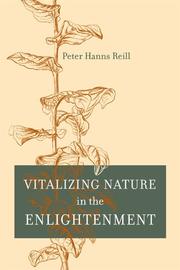| Listing 1 - 2 of 2 |
Sort by
|

ISBN: 9786612357497 0520931009 1282357492 1598755471 9780520931008 0520241355 9780520241350 9781598755473 9781282357495 Year: 2005 Publisher: Berkeley University of California Press
Abstract | Keywords | Export | Availability | Bookmark
 Loading...
Loading...Choose an application
- Reference Manager
- EndNote
- RefWorks (Direct export to RefWorks)
This far-reaching study redraws the intellectual map of the Enlightenment and boldly reassesses the legacy of that highly influential period for us today. Peter Hanns Reill argues that in the middle of the eighteenth century, a major shift occurred in the way Enlightenment thinkers conceived of nature that caused many of them to reject the prevailing doctrine of mechanism and turn to a vitalistic model to account for phenomena in natural history, the life sciences, and chemistry. As he traces the ramifications of this new way of thinking through time and across disciplines, Reill provocatively complicates our understanding of the way key Enlightenment thinkers viewed nature. His sophisticated analysis ultimately questions postmodern narratives that have assumed a monolithic Enlightenment-characterized by the dominance of instrumental reason-that has led to many of the disasters of modern life.
Science --- Vitalism. --- Biology --- Life (Biology) --- Mechanism (Philosophy) --- History --- Philosophy --- Vitalism.. --- Science -- History -- 18th century. --- 18th century. --- animism. --- charles louis dumas. --- chemistry. --- counter enlightenment. --- cuvier. --- early modern enlightenment. --- enlightenment. --- epigenesis. --- generation. --- history of science. --- history. --- life force. --- life science. --- mechanism. --- modernity. --- natural history. --- natural philosophy. --- natural world. --- nature. --- naturphilosophie. --- philosophy. --- physiology. --- reason. --- relationship with nature. --- religion and science. --- reproduction. --- romanticism. --- science. --- scientific disciplines. --- spark of life. --- stahlian chemistry. --- vitalism. --- william cullen.
Book
ISBN: 9786613589705 1280494476 1400842409 9781400842407 9781280494475 0691147884 9780691147888 0691147892 9780691147895 9780691147888 9780691147895 Year: 2012 Publisher: Princeton, NJ
Abstract | Keywords | Export | Availability | Bookmark
 Loading...
Loading...Choose an application
- Reference Manager
- EndNote
- RefWorks (Direct export to RefWorks)
Robert Wokler was one of the world's leading experts on Rousseau and the Enlightenment, but some of his best work was published in the form of widely scattered and difficult-to-find essays. This book collects for the first time a representative selection of his most important essays on Rousseau and the legacy of Enlightenment political thought. These essays concern many of the great themes of the age, including liberty, equality and the origins of revolution. But they also address a number of less prominent debates, including those over cosmopolitanism, the nature and social role of music and the origins of the human sciences in the Enlightenment controversy over the relationship between humans and the great apes. These essays also explore Rousseau's relationships to Rameau, Pufendorf, Voltaire and Marx; reflect on the work of important earlier scholars of the Enlightenment, including Ernst Cassirer and Isaiah Berlin; and examine the influence of the Enlightenment on the twentieth century. One of the central themes of the book is a defense of the Enlightenment against the common charge that it bears responsibility for the Terror of the French Revolution, the totalitarian regimes of the twentieth-century and the Holocaust.
Enlightenment. --- Aufklärung --- Eighteenth century --- Philosophy, Modern --- Rationalism --- Rousseau, Jean-Jacques, --- Alasdair MacIntyre. --- Correspondance complte de Rousseau. --- Counter-Enlightenment. --- Die Philosophie der Aufklrung. --- Enlightenment Project. --- Ernst Cassirer. --- European philosophy. --- French Revolution. --- Grand Tour. --- Hegel. --- Isaiah Berlin. --- Jacques Rousseau. --- Jean-Jacques Rousseau. --- Jean-Philippe Rameau. --- Karl Marx. --- Lettre sur la musique franoise. --- Pierre-Paul Plan. --- Pufendorf. --- Ralph Leigh. --- Robert Wokler. --- Rousseau. --- Theodore Besterman. --- Thophile Dufour. --- Voltaire. --- anthropological theory. --- apes. --- civilization. --- conceptual history. --- cosmopolitanism. --- culture. --- eighteenth-century philosophy. --- equality. --- freedom. --- human race. --- human sciences. --- humanity. --- humankind. --- imagination. --- interpretation. --- jurisprudence. --- language. --- liberalism. --- liberaty. --- liberty. --- manuscripts. --- modernity. --- moral values. --- music. --- musical philosophy. --- nation-state. --- natural goodness. --- natural law. --- philosophers. --- philosophy of history. --- physical evolution. --- pluralism. --- political doctrines. --- political philosophy. --- political theory. --- political thought. --- politics. --- property. --- publishing. --- reason. --- reverie. --- self-realization. --- social corruption. --- social evolution. --- social sciences. --- totalitarianism. --- travel. --- travelers. --- writing.
| Listing 1 - 2 of 2 |
Sort by
|

 Search
Search Feedback
Feedback About UniCat
About UniCat  Help
Help News
News